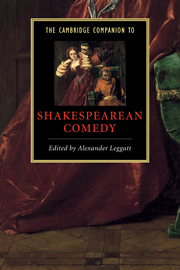1 - Theories of comedy
from Part 1 - Shakespeare and comic tradition
Published online by Cambridge University Press: 28 May 2006
Summary
Comedy is notoriously resistant to theorization. There is, after all, something inescapably comic and self-defeating about the scholar, oblivious to comedy's charms, searching out its origins or trying to account for its effects. In Cicero's De Oratore, one of the interlocutors in the discussion of the comic notes that everyone “who tried to teach anything like a theory or art of this matter proved themselves so conspicuously silly that their very silliness is the only laughable thing about them.” Small wonder then, that at the conclusion of Umberto Eco's The Name of the Rose the sole manuscript of Aristotle's treatise on comedy, the counterpart to his discussion of tragedy in The Poetics, should perish and a fire destroy the monastery library in which the corpus of classical learning has been preserved. But the situation is, of course, more complicated than Eco's fable suggests, both because of widely known alternate accounts of comedy in the classical tradition and of the presence of the outlines of a theory of the genre in The Poetics itself. Any discussion of theories of comedy in the Renaissance will inevitably emphasize the importance of these resources in sixteenth-century discussions of the issue.
This approach runs certain risks: there were, after all, sometimes divergent conceptions of comedy in the period. Moreover, Shakespeare’s comedies in particular resist theoretical and generic pigeonholing.
- Type
- Chapter
- Information
- The Cambridge Companion to Shakespearean Comedy , pp. 3 - 17Publisher: Cambridge University PressPrint publication year: 2001
- 2
- Cited by

